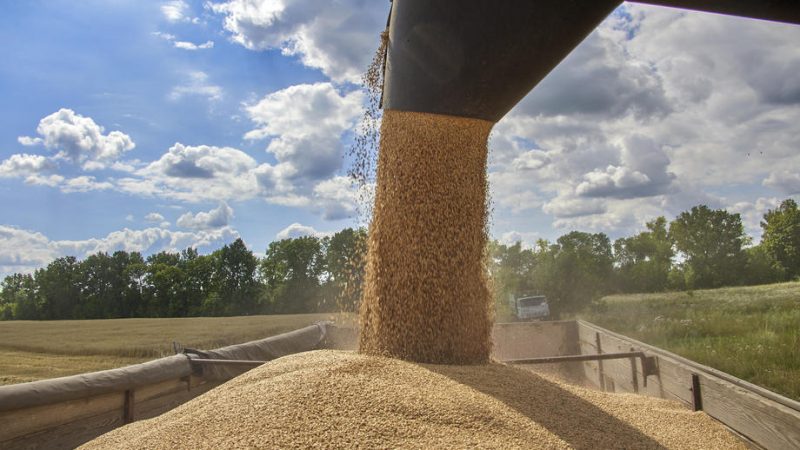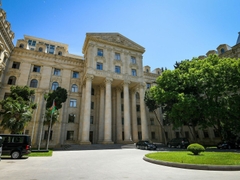Russia says it will resume its participation in the Türkiye-brokered deal that guarantees the safe passage of commercial ships from Ukraine through the Black Sea, putting an end to fears of reigniting a global food crisis.
Addressing the Security Council meeting on Wednesday, four days after Moscow suspended support for grain exports, President Vladimir Putin said he would honor the deal after Ukraine vowed not to use a designated Black Sea corridor to attack Russian forces.
The Russian defense ministry justified the decision by saying that it had received written guarantees from Kyiv not to use the Black Sea grain corridor for military operations against Russia.
“We demanded assurances and guarantees from the Ukrainian side that ... humanitarian corridors will not be used for military purposes,” Putin said. “I have given instructions to the Ministry of Defense to resume our full participation in this work.”
Yet, President Putin warned that Moscow reserves the right to withdraw again from the agreement if Kyiv breaks its word.
He went further to praise Turkish mediation efforts to put the deal back on track and specifically mentioned Erdogan’s efforts of “ensuring the interest of the poorest countries.”
Russia pulled out of the Türkiye-brokered deal last week, arguing that it could not guarantee safety for civilian ships crossing the Black Sea because of alleged drone attacks on the Crimean city of Sevastopol carried out by the Ukrainian forces. Ukraine has denied the accusations, saying that was a false pretext.
Shipments via the Black Sea resumed in early August after ministers from Ukraine and Russia each inked separate but identical grain-and-fertilizer export agreements in Istanbul on July 22. The landmark agreement, brokered by Türkiye and the United Nations, permitted Ukrainian grain exports to restart through the Black Sea ports. Exports were initially stopped when Russia launched what it called a “special military operation” on February 24. Millions of tonnes of grain were trapped in the country’s silos, causing the surge in food prices, as well as fears of a global food crisis.
As part of the deal, Ukraine resumed grain exports through its ports in the Odesa region, while Moscow secured guarantees for its own grain and fertilizer exports.
The agreement, which resulted in nine million tons of Ukrainian grain exports, was set to be renewed on November 19.
Ukraine and Russia are both significant food suppliers, accounting for 29 percent of wheat exports and 80 percent of sunflower exports globally, which are transported mainly through the Black Sea.
Ukraine, known as one of the world's breadbaskets, is a top grain supplier to dozens of developing countries. Last year, the country's grain exports totalled $12.2 billion, accounting for nearly a fifth of the country’s total exports. Prior to the war, Ukraine exported 98 percent of its cereals and oilseed via the Black Sea, at a rate of up to 6 million tonnes per month. But with the ports blocked and the railway system unable to cope with the extra volume, the country was only exporting between 1-1.5 million tonnes a month.
Russia’s recent withdrawal from the deal had reignited fears over global hunger and food prices as the inability to export grain from Ukrainian ports directly causes surges in food prices. On Monday, wheat futures on the Chicago Board of Trade rallied by around six percent to almost 8.80 dollars a bushel amid Russia’s withdrawal from the grain exports deal. The price of corn was up 2.3 percent to 6.96 dollars a bushel. Palm oil futures trading in Malaysia also rose on fears over the potential impact on exports of Ukrainian sunflower oil.







 Turkmenistan's Foreign Minister Rashit Meredow and EU's Special Representative for Central Asia Terhi Hakala have discussed prospects for cooperati...
Turkmenistan's Foreign Minister Rashit Meredow and EU's Special Representative for Central Asia Terhi Hakala have discussed prospects for cooperati...
 In a high-profile trial that has gripped the nation, Kuandyk Bishimbayev, Kazakhstan’s former economy minister, has been sentenced to 24 years in p...
In a high-profile trial that has gripped the nation, Kuandyk Bishimbayev, Kazakhstan’s former economy minister, has been sentenced to 24 years in p...
 Foreign Minister of Azerbaijan Jeyhun Bayramov met with his Armenian counterpart Ararat Mirzoyan in Almaty, Kazakhstan, to negotiate the peace agenda.
Foreign Minister of Azerbaijan Jeyhun Bayramov met with his Armenian counterpart Ararat Mirzoyan in Almaty, Kazakhstan, to negotiate the peace agenda.
 Russia is moving forward with what it calls a “special military operation” in Ukraine with its forces advancing in the Kharkiv region.
Russia is moving forward with what it calls a “special military operation” in Ukraine with its forces advancing in the Kharkiv region.



